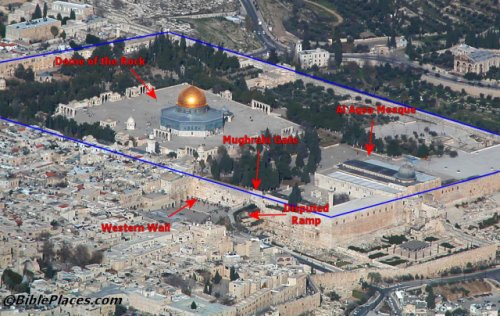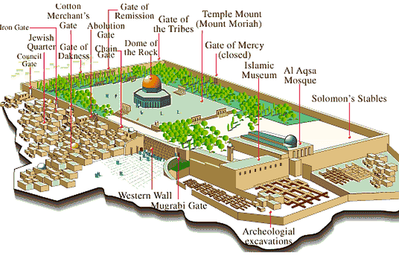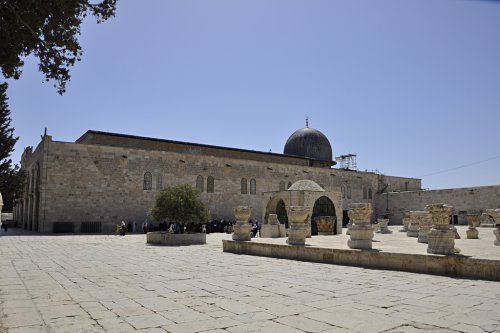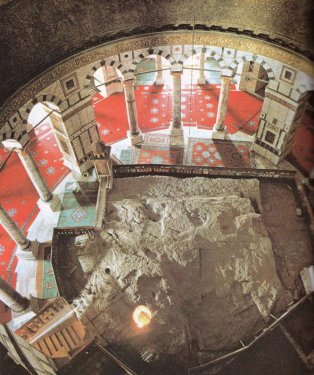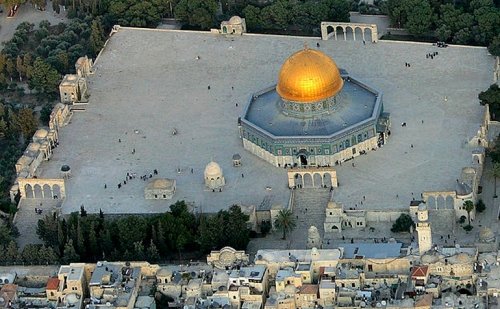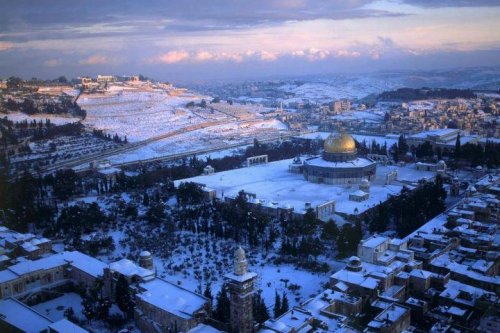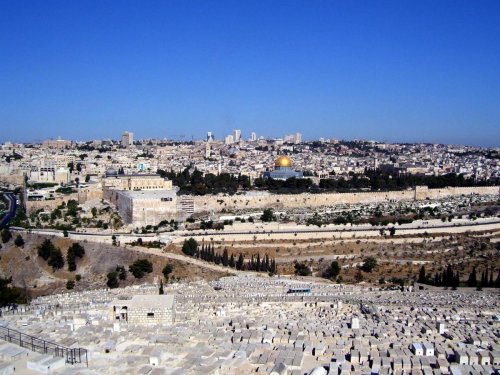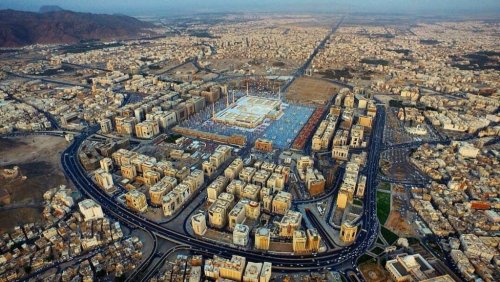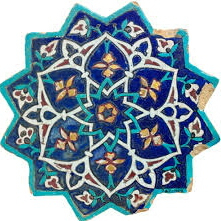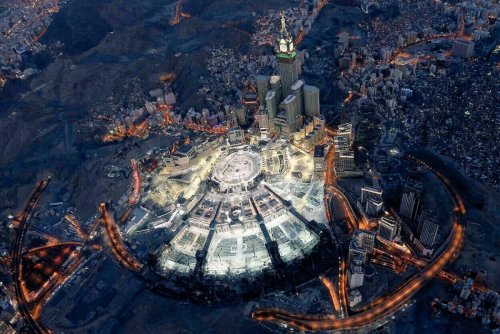-
Posts
8,434 -
Joined
-
Days Won
771
Content Type
Profiles
Forums
Events
Everything posted by ummtaalib
-
Pictures (Click on pictures to enlarge) Jerusalem Masjid Al-Qibly Dome of the Rock (Qubbatus Saqqara) Aerial view The rock under the Dome Sunset Covered in snow
-
Entering Israel Please read and heed the advices 1 Don’t travel alone! I went alone and it is neither advisable nor recommended. May Allah (SWT) save me from arrogance and I am not trying to say that I am some sort of a Macho but I would NOT recommend for anyone to travel alone (at least for the first time). There are plenty of Hajj/Umrah groups who will take you at a very reasonable price. 2 Most Muslims would be going to Israel to visit The Dome of the Rock and Masjid Aqsa. It is perfectly safe because you don’t cross any check points or borders. If you are worried about safety just stay in Jerusalem and don’t venture into Palestinian Authority areas. I met groups from Britain with their wives, sisters, mothers, babies in and it is perfectly safe. 3 If you are stupid enough to enter Israel wearing a “Free Gaza” wristband or “Free Palestine Shirt” then you deserve to be deported! 4 Whether you enter Israel via a direct flight or via Amman (Jordan) you will be racially and ethnically profiled and subjected to severe questioning and interrogation. You WILL be held up; it’s just a question of for how long! I was held up for 3 ½ hours at Ben Gurion International Airport (Tel-Aviv) but a British (Muslim) visitor told me that he was held up for 9 hours at the Amman. Doesn’t matter where you cross from you will be interrogated! 5 Your phone, phone calls, messages, WhatsApp, Telegram or whatever you have will be thoroughly scrutinised and checked. 6 You will be asked to provide details of all your phone numbers and emails. 7 Your laptop and/or electronic devices will be thoroughly checked. 8 You will be asked to provide details and address of your local Mosque. 9 You will be asked to provide details of your Parents and Grandparents. 10 You may be asked as to how your parents met and got married. 11 You will be asked about your employment details. 12 You will be asked if you know any Arabs or Palestinians inside Israel. 13 You baggage will be machine and hand searched and any items which may be questionable will have to be explained. 14 Your guide books, notes (for your trip) will need to be explained. If you have gotten them from a library you will be asked about the library. 15 I had 3 separate Interviews and same sort of questions were asked again and again and again. 16 Basically, the questions will be petty but relentless and they are observing your reactions and body language (twitching, itching, and nervousness). You have nothing toworry about and let them do their job. 17 Unlike Saudi Arabian & Jordanian authorities Israelis are not rude or discourteous; they are just thorough. Arab immigration authorities are rude, obnoxious and just try to bully you. 18 If you are a Muslim then an Israeli VISA on your passport will cause problems when visiting Saudi Arabia, Pakistan etc. so request for them to stamp a piece of paper and not your passport. This is a standard request and common. 19 If you are a practising Muslim with a long Beard or a face covering then you won’t have much of a problem because there are many Tourists who are practising. 20 If you are a non-practising Muslim you will still be subjected to profiling and interrogation. 21 If you are a Muslim you may be asked to recite passages from the Qur'aan by both Isareli & Palestinian Authority areas. 22 Once you get your VISA if you decide to stay at only then there are no others Security checks or checkpoints for you to worry about. 23 If you go into Palestinian territories then entering into them is not a problem but entering back into Israeli areas you will have to cross checkpoints and may bequestioned about your visit etc. I wasn’t even once. 24 When leaving Israel you will be questioned and interrogated again and your phone, laptop, photographs, notes checked. Keep all your bus, hotel and food receipts while you stay in Israel so when you get questioned on your return you can show them. 25 The currency of both Israel and Palestinian Authority areas is called Israeli new shekel (NIS). Both Israeless and Arabs merely refer to it as "Shekel". I found that I received a better exchange rate at my local ASDA (in UK) compared to Israel so I then used my non-commission Credit Card and it worked out cheaper compared to changing currency. 26 If you will be travelling deep into Palestinian Authority areas carry Euros or US Dollars instead of British Sterling Pounds. 27 Israel has standard European Electric sockets and the power supplied is single phase 220 volts at 50 Hertz. 28 I stayed at Mount Olives Hotel; it is owned by Palestinians and most Guests are also Muslims. 29 Finally, you are entering land which is Holy to Islam, Judaism & Christianity so show some respect. If you are unable to show respect go to Disneyland. If you still decide to go and be discourteous you need to be publicly whipped by a wet lettuce! Central-Mosque
-
Your Rights at Ben-Guiron Airports Searches PP - Interrogation Ben Gurion.pdf
-

On Imam Abu Hanifah (Rahimahullah)
ummtaalib replied to ummtaalib's topic in Prophets, History & Biographies
The real accomplishment of Imaam Abu Haneefah (RA) was the documentation and codification of the science of Fiqh. Thousands of intricate questions were raised during his time, which he solved with the teachings of the Qur'aan and the Ahadeeth. In fact, it was his principle never to venture beyond the teachings of the Qur'aan, the Ahadeeth, consensus of the Ummah, and the statements of the Sahabah (RA) when solving the various questions that arose. He established a committee that deliberated upon the various questions at length and viewed them in the light of Qur'aan, the Ahadeeth, consensus of the Ummah and analytical deduction (Qiyaas). The decisions they reached were then documented. This practice continued for 30 years. Ulema have written that Imaam Abu Haneefah (RA) had solved approximately 1 200 000 questions pertaining to acts of Ibaadah, monetary dealings and various other aspects of Deen. All these have been presented before the Ummah. Acknowledging his intellectual prowess in Fiqh and his mastery of the Qur'aan and Ahadeeth, senior Fuqahaa and Muhadditheen have stated that Imaam Abu Haneefah (RA) was the greatest Faqih (jurist) of his time and one who understood the objectives of the Qur'aan and the Ahadeeth. Even Imaam Shaafi’ee (RA) stated that he had never known a jurist better than Imaam Abu Haneefah (RA) and that everyone needs him in the field of Fiqh. Madrasah in Just 5 Minutes Mufti A.H.Elias-May Allaah protect him -
Duaa and Actions after Seeing a Bad Dream If one experiences a bad dream, one should recite the following duaa thrice, and one should change one’s sleeping position. One should not mention the dream to anybody. أَعُوذُ بِاللهِ مِنَ الشَّيْطَانِ الرَّجِيم عن جابر رضي الله عنه عن رسول الله صلى الله عليه وسلم أنه قال إذا رأى أحدكم الرؤيا يكرهها فليبصق عن يساره ثلاثا وليستعذ بالله من الشيطان ثلاثا وليتحول عن جنبه الذي كان عليه (مسلم رقم 2262) Hadhrat Jaabir (Radhiallahu Anhu) reports that Rasulullah (Sallallahu Alaihi Wasallam) said: “When you see a bad dream, then spit on your left thrice (i.e. one should emulate the action of one who is spitting, without any saliva leaving the mouth), and thereafter seek protection of Allah Ta’ala thrice from Shaytaan, and one should change one’s sleeping position. عن أبي سلمة قال: لقد كنت أرى الرؤيا فتمرضني حتى سمعت أبا قتادة يقول: وأنا كنت لأرى الرؤيا تمرضني حتى سمعت النبي صلى الله عليه وسلم يقول: الرؤيا الحسنة من الله فإذا رأى أحدكم ما يحب فلا يحدث به إلا من يحب وإذا رأى ما يكره فليتعوذ بالله من شرها، ومن شر الشيطان، وليتفل ثلاثا ولا يحدث بها أحدا فإنها لن تضره (بخاري رقم 7044) Hadhrat Abu Salama (Radhiallahu Anhu) says: “I used to see such disturbing dreams which used to cause me to become ill, until I heard Hadhrat Abu Qataadah (Radhiyallahu Anhu) say: ‘I also used to see such disturbing dreams which used to cause me to become ill until I heard Rasulullah (Sallallahu Alaihi Wasallam) say: “Good dreams are from Allah Ta’ala. If anyone of you sees a good dream that pleases him, then he should only mention it to someone who he is fond of. And if he sees a bad dream, then he should seek the protection of Allah Ta’ala from its evil and from the evil of Shaytaan, and he should spit thrice (on his left side), and he should not mention such a dream to anyone, the evil of such a dream will not cause him any harm. Ihyauddeen.co.za
-
Q: Does touching one's private part nullify one's wudhu according to the Hanafi Mazhab? A: No, it does not nullify the wudhu. And Allah Ta'ala (الله تعالى) knows best. ( لا ) ينقضه ( مس ذكر ) لكن يغسل يده ندبا قال الشامي : قوله ( لكن يغسل يده ندبا ) لحديث من مس ذكره فليتوضأ أي ليغسل يده جمعا بينه وبين قوله هل هو إلا بضعة منك حين سئل عن الرجل يمس ذكره بعد ما يتوضأ وفي رواية في الصلاة أخرجه الطحاوي وأصحاب السنن إلا ابن ماجه وصححه ابن حبان وقال الترمذي إنه أحسن شيء يروى في هذا الباب وأصح ويشهد له ما أخرجه الطحاوي عن مصعب بن سعد قال كنت آخذا على أبي المصحف فاحتككت فأصبت فرجي فقلت نعم فقال قم فاغسل يدك وقد ورد تفسير الوضوء بمثله في الوضوء مما مسته النار وتمامه في الحلية والبحر أقول ومفاده استحباب غسل اليد مطلقا كما هو مفاد إطلاق المبسوط خلافا لما استفاده في البحر من عبارة البدائع من تقييده بما إذا كان مستنجيا بالحجر كما أوضحه في النهر (رد المحتار 1/ 147) Answered by: Mufti Zakaria Makada Checked & Approved: Mufti Ebrahim Salejee (Isipingo Beach)
-
Q. Are men and women allowed to wear synthetic silk clothing? A. Gold and silk have been permitted for females and forbidden for males. Rasulullah Sallallahu Alayhi Wasallam said: “Gold and silk have been permitted for the females of my Ummah, and forbidden to the males.” (Nasaai) The silk forbidden for males refers to pure silk produced from silk worms. It does not refer to synthetic or manufactured silk that is commonly referred to as silk clothing nowadays. Therefore, it would be permissible for males to wear clothing made of synthetic or manufactured silk and it would be forbidden for them to wear clothing made of pure silk. (Ahsanul Fataawa 8/66) However, it is permissible for females to wear both synthetic and pure silk clothing. And Allah Ta’ala Knows Best Mufti Ismaeel Bassa Confirmation: Mufti Ebrahim Desai (Islamic rulings on this Q&A newsletter are answered in accordance to the Hanafi Fiqh) Fatwa Department Jamiatul Ulama (KZN) Council of Muslim Theologians
-

On Imam Abu Hanifah (Rahimahullah)
ummtaalib replied to ummtaalib's topic in Prophets, History & Biographies
When he grew up, Imaam Abu Haneefah (RA) paid keen interest in acquiring the knowledge of Deen and studied under senior teachers and Imaams, eventually mastering the sciences he learned. The Fuqahaa and Muhadditheen attest to his proficiency in these fields and acknowledge that he was indeed a Haafidh of Ahadeeth. He did not only study under the famous Muhadditheen of Kufa, but also travelled to Makkah and Madinah to study Ahadeeth. His teachers numbered almost 400. Allaama Dhahabi (RA) writes, “Imaam Abu Haneefah (RA) was an expert in the science of Ahadeeth and was regarded as one of the Huffaadh of Ahadeeth.” In fact, contribution to the science of Ahadeeth was tremendous in that he was the first to deliberate upon the conditions for narrating Ahadeeth and to specify the various ranks of the Ahadeeth. He was also well aware of the lives and credibility of the various narrators of Ahadeeth. It is for this reason that Hadhrat Imaam Abu Yusuf (RA) would say that Imaam Abu Haneefah (RA) knew more authentic Ahadeeth than he did. Madrasah in Just 5 Minutes Mufti A.H.Elias-May Allaah protect him -
-

On Imam Abu Hanifah (Rahimahullah)
ummtaalib replied to ummtaalib's topic in Prophets, History & Biographies
Imaam Abu Haneefah (RA), whose real name was Nu’maan bin Thaabit was born in the year 80 A.H. in a family of businessmen. He saw Rasulullaah (Sallallahu Alaihi Wa Sallam)’s special servant, the eminent Sahabi Hadhrat Anas bin Maalik (RA). Imaam Abu Haneefah (RA) possessed an excellent memory. He always assisted the poor, fulfilled the rights of his neighbours and behaved cordially even towards his enemies and antagonists. He engaged in Salaah all night and wept so much during the Salaah that people outside the house heard him and took pity on him. Hadhrat Nasr bin Haajib (RA) says that he sometimes spent the night at the house of Imaam Abu Haneefah (RA) and would see him weep so profusely that his tears wet the mat as they fell like rain. He says that he could actually hear them fall. Imaam Abu Haneefah (RA) assisted his poor students and used to even send money to their homes for household expenses. He avoided the ruling class and would not accept the gifts they sent him. Impressed by his courage and outspoken manner in defence of the truth, the Khalifah Mansoor’s wife once sent fifty thousand Dirhams and an exquisite conveyance for Imaam Abu Haneefah (RA), but he declined the gift saying, “I did it for Allaah and in defence of the Deen, not for worldly gain.” Madrasah in Just 5 Minutes Mufti A.H.Elias-May Allaah protect him -
Following the Pious Servants of Allah Ta‘ala http://ihyaauddeen.co.za/wp-content/uploads/2016/08/Pathway-1.jpg Hazrat Mufti Ebrahim Salejee (Daamat Barakaatuhu) mentioned: In Surah Faatihah we ask for guidance to the straight path. But what is this path and how will that guidance come? This is explained in the next verse: صِرَاطَ ٱلَّذِينَ أَنْعَمْتَ عَلَيْهِمْ “The path of those whom you have favoured” They have adequate knowledge of the sharee‘ah and they also enjoy Allah Ta‘ala’s special grace. They are not those who stray away from the path of truth and righteousness.
-
@Maulana_Imtiyaz Be good in your appearance and eyes will never forget you. Be good in your character and hearts will never forget you.
-
Teachings of our Mashaaikh – How to think that everyone is better than you. This is a very important teaching as many times we think that we are better than the next person. It creates Takabbur (Pride / Haughtiness) in our hearts. The person who has Takabbur will never be able to enter Paradise. So what we need is humbleness and an easy way to get humbleness is feel that “everyone is better than me”. Below are a few points to help us develop this feeling: 1. If the person is elder than you: Think that because his life span was longer than mine, he had the opportunity of so many more Ramadaans, more opportunities of fasting in the month of Ramadaan, he had more opportunities to sit in the company of the pious, to make more Salaah. His good ‘Aamaal (deeds) are more than mine. For example: My age is only 25, his age is 55, so even if I performed many deeds, his deeds are much more than mine, so that’s why he is better than me. 2. If the person is younger than you: We can then easily think that because my lifespan was longer, I have made more mistakes than him. His sins are less than mine, so that’s why he is better than me. 3. If the person is a big sinner: We must think that if he will make Taubah (repent to Allah) at any moment, Allah can change all of his sins to virtue. – Allah Almighty says in the Qur’aan: أُولَئِكَ يُبَدِّلُ اللَّهُ سَيِّئَاتِهِمْ حَسَنَاتٍ (Ulaa-ika-Yubaddilullahu Say-yiaatihim Hasanaat) “They are those whom Allah will changed their misdeeds into virtue.” So if Allah Subhannahu Wa Ta’ala will change his sins into virtue, he will become better than me. So still he is better than me. Think even a dog to be better than you! Imaam Rabbbani Hazrat Mujaddid Alf Thaani (Rahmatullah Alayh) has written in his Maktubaat (letters) that the animals are also better than us. He gave the example of a dog, that a dog is more grateful to his owner than we are to our Master, Allah Subhaanahu Wa Ta’aala. Look at the life of a dog, it takes whatever little it gets and stays awake all night to safeguard the house of its master and we eat so many different foods and keep enjoying everything and yet when night comes we keep lying in our beds, we do not even wake for Tahajjud. So it means that the dog is even better than us because even if the master punishes the dog, the dog will never leave the master, yet if we face a little calamity we leave going to the Masjid. We must try to change our way of thinking in order to rid ourselves from this poisonous disease of Kibr (pride) and develop humbleness. (From a lecture of Shaykh Zulfiqar Ahmad Naqshbandi [May Almighty Allah elevate him) titled “Think everyone is better than you”) Source
-
Contributing towards a Marhoom's Qurbani when not performing one's own Q. Slmz I would like to know if it is permissible for one to contribute towards the share for a marhoom if one is not making their own qurbani (person does not have nisaab and cannot make their own) Jzk A. Qurbani is Waajib (compulsory) on every Muslim person who is the owner of Nisaab during the days of Eid. The Nisaab amount is currently R5437.75 in South Africa (as at 24 August 2016). If a person is not the owner of the Nisaab amount during the days of Eid, Qurbani is not Waajib (compulsory) on such a person. It is permissible for such a person to contribute towards the share of the Qurbani on behalf of a Marhoom (deceased person). And Allah Ta’ala Knows Best Mufti Ismaeel Bassa Confirmation: Mufti Ebrahim Desai (Islamic rulings on this Q&A newsletter are answered in accordance to the Hanafi Fiqh) Fatwa Department Jamiatul Ulama (KZN) Council of Muslim Theologians
-
Mustahabb (rewardable) fasts of the Year Besides the fard (obligatory) fast of Ramadan, there are various Nafl (optional) fasts that Nabi (sallallahu ‘alayhi wasallam) kept throughout the year. We too can make an intention of following in His foot steps this year Insha Allah. The Sahabah (radiyallahu ‘anhum) mention that, at times, Rasulullah (sallallahu ‘alayhi wasallam) would fast so much that we thought he would not stop and at times he (sallallahu ‘alayhi wasallam) did vice versa. (Sahih Bukhari, Hadith: 1141, 1972) The Fuqaha (jurists) have classified these fasts into 2 types; a) Sunnat and b) Mustahabb (preferable). The fast of the 9th and 10th or 10th and 11th of Muharram has been classified as a Sunnah fast. (Durrul Mukhtar vol.2 pg.374; Maraqiul Falah pg.350). By fasting on the 10th, one year’s minor sins are forgiven. (Sahih Bukhari, Hadith: 2000-2007; Sahih Muslim, Hadith: 2838) The following fasts are classified as Mustahabb (meritorious): 1. Every Monday and Thursday. (Maraqiul Falah pg.350; Alamgiri vol.1 pg.201). Virtue: Rasulullah (sallallahu ‘alayhi wasallam) chose to fast these days because the deeds of the Ummah are presented to Allah Ta’ala on these 2 days. (Sahih Muslim, Hadith: 2742; Sahih ibn Khuzaymah, Hadith: 2116-2120) 2. The 13th, 14th and 15th of every month which are known as Ayyamul beedh. (Maraqiul Falah pg.350; Durrul Mukhtar vol.2 pg.375; Alamgiri vol.1 pg.201). Virtue: One who observes these fasts every month will be rewarded as if he fasted his entire lifetime. (Sahih ibn Khuzaymah, Hadith: 2128; Sunan al-Tirmidhi, Hadith: 762; Musnad Ahmad vol.5 pg.140, 252;). However, the 13th of the month of Dhul-Hijjah is excluded. (Imdadul Fatawa) 3. Any three days of each month. (Shami vol.2 pg.375; Tahtawi ala Maraqil falah pg.350; Sahih Bukhari, Hadith: 1981; Sahih Muslim, Hadith: 2736, 2739). Virtue: The reward of this fast is same as the previous. In fact this one could be incorporated in the Ayyaamul beedh. (Shami; Sahih ibn Khuzaymah vol.3 pg.303) 4. The 9th of Dhul-Hijjah which is the day of Arafah. However, the Haji who is in Arafah is excluded, because he may be weakened through the fast. If this is not the case, then the Haji may also keep this fast. (Durrul Mukhtar vol.2 pg.375). Some Ulama have classified this as a Sunnah fast just like the 10th of Muharram. (Shami vol.2 pg.375). Virtue: By fasting on this day, two years minor sins will be forgiven. (Sahih Bukhari, Hadith: 1988; Sahih Muslim, Hadith: 2738-2739) 5. Any six days of Shawwal (month after Ramadan) besides the first of Shawwal; Eid day. (Maraqiul falah pg.350; Alamgiri vol.1 pg.201). Virtue: The one who observes these fasts after observing the fast of Ramadan, will receive the reward of fasting for the entire year. (Sahih Muslim, Hadith: 2750; Sahih ibn Hibban, Hadith: 3634; Sahih ibn Khuzaymah, Hadith: 2114) 6. On Fridays. (Shami vol.2 pg.375; Maraqiul falah pg.350; Alamgiri vol.1 pg.201). However, it is better to fast a day before it or after it as well. (Sahih Muslim, Hadith: 2678; Sahih ibn Khuzaymah, Hadith: 1229;) 7. Saturday and Sunday (together). (Shami vol.2 pg.375-376 refer Sahih ibn Khuzaymah vol.3 pg.318 Hadith: 2167; Sahih ibn Hibban, Hadith: 3616; Mustadrak al-Hakim;) 8. As much as possible in the first half of the month of Sha’ban with no specification on condition that one is confident that this will not weaken him for the fast of Ramadan. (Alamgiri vol.1 pg.201 refer Sahih Bukhari, Hadith: 1969; Sahih Muslim, Hadith: 175, 176, 1156) 9. Any or all of the first nine days of Dhul-Hijjah. (Alamgiri vol.1 pg.201). Virtue: The fast of each of these days is equal to the fast of one year. (Sunan Tirmidhi, Hadith: 758, Shu’abul Iman, Hadith: 3758) 10. As much as possible, in the month of Muharram. Virtue: The best fast after Ramadan is the fast of Muharram (Sahih Muslim, Hadith: 2748) For each fast one will receive the reward of fasting for 30 days. (Tabarani; Targheeb vol.2 pg.114) These are most of the fasts that Rasulullah (sallallahu ‘alayhi wasallam), either observed himself or encouraged others to observe. Since fasting is an act of worship in itself, the Fuqaha have stated that it is virtuous for one to fast as much as possible (if he has the strength to do so). Most Beloved Fast in the sight of Allah Rasulullah (sallallahu ‘alayhi wasallam) is reported to have said that the most beloved fasts to Allah is the fast of Dawud (‘alayhis salam); he would fast every alternate day. (Sahih Bukhari, Hadith: 1131; Sahih Muslim, Hadith: 2731-2732). Note: it is forbidden to fast on the days of both Eids as well as the 11th, 12th, and 13th of Dhul-Hijjah. (Sahih Bukhari, Hadith: 1990; Sahih Muslim, Hadith: 2666-2672; Sahih ibn Khuzaymah, Hadith: 2100; Shami vol.2 pg.375) and Allah Ta’ala Knows Best al-miftah
-
-
How to Perform Hajj: Step by Step Demonstration Mufti Abdur-Rahman ibn Yusuf Part 1 Part 2 Part 3 Final Part Also available on YouTube: Practical Ihram Demonstration by Mufti Abdur-Rahman ibn Yusuf
- 11 replies
-
- hajj
- hajj/umrah resources
-
(and 1 more)
Tagged with:
-
Hajj: A Journey of Love - A must listen before you go Mufti Abdur-Rahman ibn Yusuf
- 5 replies
-
- hajj
- hajj/umrah resources
-
(and 1 more)
Tagged with:
-
Hajj & Umrah Lectures from Sacred Learning Listen | Download Length 11.05.06 Hajj Seminar Part I | 70' 31" 11.05.06 Hajj Seminar Part I - Q & A | 02' 38" 11.05.06 Hajj Seminar Part II | 07' 03" 11.05.06 Hajj Seminar Part II - Q & A | 03' 40" 11.05.06 Hajj Seminar Part III | 10' 00" 11.05.06 Hajj Seminar Part III - Q & A | 02' 14" 11.05.06 Hajj Seminar Part IV | 31' 18" 11.05.06 Hajj Seminar Part V | 09' 50" 11.05.06 Hajj Seminar Part VI | 18' 49" 11.05.06 Hajj Seminar Part VI - Q & A | 12' 42" 10.20.06 Visiting Masjid Nabawi | 34' 19" 10.19.06 Performing Hajj: Days 3-6 | 39' 17" 10.18.06 Umrah: Sa'i | 33' 33" 10.18.06 Performing Hajj: Days 1-2 | 58' 50" 10.17.06 Entering the Haram | 41' 37" 10.17.06 Umrah: Tawaf | 57' 18" 10.16.06 Preparing for the Journey - Making a Will | 42' 20" 10.16.06 The Journey Begins | 56' 39" 10.15.06 The Mandate of Hajj | 38' 33" 10.15.06 Preparing for the Journey - General Themes | 51' 19" 10.14.06 The Days of Hajj | 18' 50" 10.14.06 Hajj - The Final Brick | 11' 53" 09.10.06 Preparing for Hajj | 92' 47"
- 11 replies
-
- hajj
- hajj/umrah resources
-
(and 1 more)
Tagged with:
-
Hajj and Umrah Classroom at Sacred Learning This classroom is dedicated to lectures covering the inner and outer aspects of Hajj and Umrah. Topics include waiting for the days of Hajj, preparing for Hajj and the journey, performing the Hajj itself, and the long-term benefits of Hajj and Umrah in our lives. While these lectures are focused on Hajj and Umrah, many of the lessons and principles discussed are relevant to everyday life. Shaykh Husain has complied essential materials from the lectures in a pocket-sized handbook entitled, Perfecting the Journey. This quick reference guide is useful for anyone traveling to the blessed cities of Makkah and Madinah. Free download is available in PDF and single page versions.
- 11 replies
-
- hajj
- hajj/umrah resources
-
(and 1 more)
Tagged with:
-
Umrah – A Step by Step Outline by Shaykh (Mufti) Ibrahim Kureshi (HA) READ Hajj – A Step by Step Outline by Shaykh (Mufti) Ibrahim Kureshi (HA) READ
- 11 replies
-
- hajj
- hajj/umrah resources
-
(and 1 more)
Tagged with:
-
Should men place the hands on the chest in Salah? DarulTahqiq This is a section from al-I’lam bi-takbir al-musalli bi makan wad’il yadayn ba’d takbiratul ihram by the Saudi based writer known as Khalid al-Shaya – [a student of the late Saudi Mufti – Abdal Aziz ibn Baz (d. 1999 CE) and the late Yemeni writer – Muqbil ibn Hadi (d. 2001)]. Al-Shaya has demonstrated that all the known narrations for placing the hands on the chest are weak (da’eef) in some way, and so can not be acted upon, or proven to be the actual Sunna of Allah’s Messenger (sallallahu alaihi wa sallam). Indeed, Imam Ahmed ibn Hanbal (d. 241 AH) said it is makruh (disliked) to place the hands on the chest in Salah, and he also said there is no harm in placing the hands beneath the navel (see Masa’il al-Imam Ahmed – riwaya of Imam Abu Dawud al-Sijistani below). This article is an indirect and useful reply to the claims of the late Nasir al-Albani (d. 1999), Bin Baz (d. 1999), Ibn Uthaymin (d. 2001), Badiud Din al-Sindi (d. 1996) of Pakistan and his students like the late Zubair Ali Za’i (d. 2013), and their inconsequential imitators from the English translators based in the West who have been advocating the placing of the hands upon the chest in Salah. Khalid al-Shaya is from the same sect as those named in this paragraph. Note also, not one of the famous 4 Imams of Islamic jurisprudence (via means of an authentic ascription to them) – Abu Hanifa (d. 150 AH), Malik (d. 179 AH), al-Shafi’i (d. 204 AH) and Ahmed ibn Hanbal (d. 241 AH) is known to have advocated the placing of the hands on the chest in Salah. To illustrate the claim made above, let us look at an authentic report emanating from the legal rulings of the great Hadith Master, Imam Ahmed ibn Hanbal (d. 241 AH), as reported by his disciple, the Imam of Hadith and author of the Sunan, Abu Dawud al-Sijistani (d. 275 AH), as reported in the latters recension of the Masa’il al-Imam Ahmed (pp. 47-48), as follows: قُلْتُ لِأَحْمَدَ ” وَضْعُ الْيَمِينِ عَلَى الشِّمَالِ فِي الصَّلَاةِ تَخْتَارُهُ؟ قَالَ : نَعَمْ “.وَسَمِعْتُهُ ” سُئِلَ عَنْ وَضْعِهِ، فَقَالَ : فَوْقَ السُّرَّةِ قَلِيلًا، وَإِنْ كَانَ تَحْتَ السُّرَّةِ فَلَا بَأْسَ“.وَسَمِعْتُهُ يَقُولُ : ” يَكْرَهُ أَنْ يَكُونَ، يَعْنِي : وَضْعَ الْيَدَيْنِ عِنْدَ الصَّدْرِ Translation: I said to Ahmed, ‘Is your chosen position to place the right hand over the left in prayer?’ He said, ‘Yes.’ And I heard that he was asked about placing it and he said, ‘slightly above the navel. If it is below the navel then there is no harm in it.’ I also heard him saying, ‘It is disliked to be like that’, that is: Placing the hands upon the chest (indas-sadr). Indeed, another famous Imam of hadith known as Ishaq ibn Rahawayh (d. 238 AH) who was not only a contemporary to Imam Ahmed, but also a teacher of Imam al-Bukhari’s (d. 256 AH), has also declared that placing the hands beneath the navel is the strongest position from the perspective of Hadith, as reported by Shaykh Ishaq ibn Mansur al-Kawsaj (d. 251 AH) in his recension of the Masa’il al-Imam Ahmed wa Ishaq ibn Rahawayh. More details are to follow in our forthcoming book in English on this matter. To keep updated on this issue please enter your email in the RSS subscription feed on this website. Peace and blessings be upon our Master Muhammad Abul Hasan Hussain Ahmed January 2014/Rabiul Awwal 1435 AH Download link Read online:
-

WOMEN - Covering The Face Of A Woman In The State Of Ihram Q/A
ummtaalib replied to ummtaalib's topic in Hajj/Umrah
Discharging the damm for covering the face in Ihraam Q: If a woman in the state of Ihraam covers her face, will damm become waajib on her? A: In the state of Ihraam if quarter or more of the face is covered for an entire day or night (i.e. 12 hours) or more then, one damm becomes waajib. If quarter or more of the face is covered for less than one day or night then sadaqa becomes waajib. If less than quarter of the face is covered for an entire day or night or more, then sadaqa becomes waajib. ( يتقي الرفث ) …. ( وقلم الظفر وستر الوجه ) كله أو بعضه كفمه وذقنه نعم في الخانية لا بأس بوضع يده على أنفه… قال الشامى: قوله ( كله أو بعضه ) لكن في تغطية كل الوجه أو الرأس يوما أو ليلة دم الربع منهما كالكل وفي الأقل من يوم أو من الربع صدقة كما في اللباب وأطلقه فشمل المرأة لما في البحر عن غاية البيان من أنها لا تغطي وجهها إجماعا اه أي وإنما تستر وجهها عن الأجانب بإسدال شيء متجاف لا يمس الوجه كما سيأتي آخر هذا الباب وأما في شرح الهداية لابن الكمال من أنها لها ستره بملحفة وخمار وإنما المنهي عنه ستره بشيء فصل على قدره كالنقاب والبرقع فهو بحث عجيب أو نقل غريب مخالف لما سمعته من الإجماع ولما في البحر وغيره في آخر هذا الباب (شامى ج 2 ص 488) و حيثما أطلق الصدقة في جناية الإحرام فهي نصف صاع من بر أو صاع من غيره إلا في جزاء اللبس و الطيب و الحلق و قلم الأظفار إذا فعل شيئا منها كاملا بعذر فهي ثلاثة أصوع طعام أو ستة من غيره و الا في جزاء اللبس اقل من ساعة و جزاء الثلاث و ما دونها من الشعر و الجراد و القمل ففيها تصدق بما شاء و لو يسيرا و الا في قتل المحرم صيدا فهي فيه قدر القيمة (لباب و غيره)… و كل صدقة تجب في الطواف فهي لكل شوط نصف صاع أو في الرمي فلكل حصاة صدقة…(لباب) –(غنية الناسك ص240) Answered by: Mufti Zakaria Makada Checked & Approved: Mufti Ebrahim Salejee (Isipingo Beach) -
The Prophetic Mudd PDF

